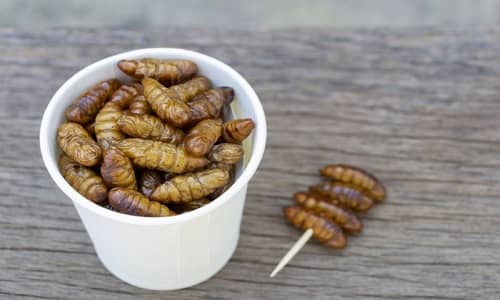5 Surprising Benefits of Silkworm, Calories, Protein Content?
Silkworm Nutrition

| Silkworm (100g) Nutrition | |||
| Carbohydrate | Protein | Fat | Calories |
| 3g | 12g | 7g | 120kcal |
| Main Nutrition | Protein, Vitamin C, Vitamin E, Calcium | ||
| Main Benefits | Skin and bone health promotion, diet effect | ||
| Side Effects | Be careful when consuming cooked Silkworm due to its high salt content. | ||
An insect that is inside a cocoon before growing into a full-fledged insect is called a silkworm. Not all types of Silkworm are edible, and the Silkworm we eat is the pupa of the silkworm moth. It is small in size, brown in color, and has stripes along its body. It is high in protein and has a savory taste. Because of its appearance, there is a lot of difference in likes and dislikes. Silkworm is often boiled and seasoned and eaten, and in Korea, it is commonly found as street food.
2. Silkworm Benefits

1. Skin Health
Silkworm is rich in unsaturated fatty acids and lecithin. These two ingredients help keep the skin moisturized. In particular, lecithin helps provide moisture to the skin. This is effective in normalizing oil secretion and maintaining oil-water balance. It also helps break down sebum in the skin. Therefore, it is effective in reducing sebum secretion and preventing skin problems such as acne.
2. Vascular Health
Silkworm contains lecithin and potassium. First, lecithin has the function of lowering cholesterol levels in the body. So, this helps remove cholesterol from the blood and inhibits the formation of blood clots in blood vessels. And it is effective in raising healthy cholesterol levels. Additionally, potassium has the function of excreting waste products and sodium from the blood, helping to cleanse the blood. This helps smooth blood circulation.
3. Brain Health
The lecithin contained in Silkworm is also helpful for brain health. Lecithin has the function of producing choline. Choline is a substance that promotes neurotransmission in the brain and plays a role in improving cognitive function. Therefore, if there is a lack of lecithin in the body, the concentration of choline may also decrease, which may cause problems such as memory loss. And lecithin helps activate the brain, which helps prevent and improve brain diseases such as dementia.
4. Bone health
Consuming silkworms may also benefit bone health. Silkworm contains nutrients that help bone health, such as calcium, iron, and phosphorus. In particular, calcium is a component of bones and is effective in helping to create and strengthen bones. This not only helps growing children, but is also effective for elderly people whose bones weaken due to aging. Silkworm also contains oleic acid, which has the function of preventing calcium from escaping from the body, helping prevent osteoporosis.
5. Diet
Silkworm is not a low-calorie food, but its high protein content makes it helpful for dieting. Silkworm helps prevent overeating because it makes you feel full longer even when you eat a small amount. And when you diet, your muscles also shrink, and the protein contained in Silkworm helps prevent this. Because protein is essential for muscle building. Silkworm also contains lecithin, which helps with diet by expelling fat from the body.
3. Silkworm How much protein does it contain?
4. Silkworm Side Effect
- Silkworms can help with diet, but they are not low in calories, and cooked silkworms sold commercially have a high salt content, which can actually have a negative effect.
- People with allergies may experience allergic symptoms if consumed.
- Excessive consumption may cause symptoms such as diarrhea.